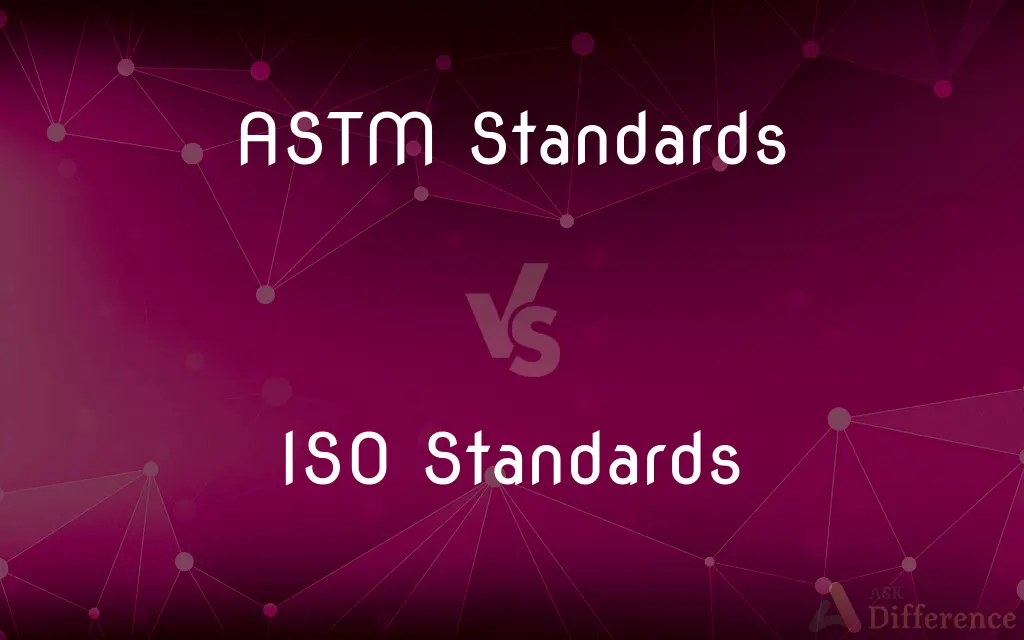ASTM Standards vs. ISO Standards — What's the Difference?
By Tayyaba Rehman — Published on January 22, 2024
ASTM Standards are developed by ASTM International, focused on materials, products, systems, and services primarily in USA. ISO Standards are international standards developed by International Organization for Standardization, with global applications.

Difference Between ASTM Standards and ISO Standards
Table of Contents
ADVERTISEMENT
Key Differences
ASTM Standards are technical standards developed by ASTM International, primarily focused on materials, products, systems, and services, with a strong presence in the United States. ISO Standards, developed by the International Organization for Standardization, are international standards that provide specifications for products, services, and systems to ensure quality, safety, and efficiency globally.
ASTM International, formerly known as the American Society for Testing and Materials, offers standards that are often more specialized and detailed, particularly in material specifications. ISO Standards are generally broader in scope, aiming for universal applicability across industries and countries.
ASTM Standards are widely recognized in American industries and are often incorporated into U.S. regulations and laws. ISO Standards, being international, are recognized and adopted globally, influencing international trade and manufacturing practices.
In terms of development, ASTM standards are created through a consensus process involving stakeholders from various sectors, focusing on specific industry needs. ISO standards are developed through a process that involves international expert committees, ensuring a wide range of global inputs.
ASTM standards often become a reference point in specific industries and sectors within the U.S., while ISO standards are key in facilitating international trade and harmonizing technical specifications in a global market.
ADVERTISEMENT
Comparison Chart
Origin
ASTM International, USA-centric
International Organization for Standardization
Focus
Materials, products, systems, U.S. centric
Broad global application across industries
Recognition
Strong in the U.S., in specific sectors
Globally recognized and adopted
Development Process
Consensus among U.S. industry stakeholders
International committees, wide global input
Application
U.S. regulations, industry-specific
International trade, universal specifications
Compare with Definitions
ASTM Standards
Detailed technical specifications primarily used in American industries.
ASTM standards ensure the quality of our manufacturing materials.
ISO Standards
Facilitates international trade through common technical guidelines.
Adhering to ISO standards simplifies our export processes.
ASTM Standards
Focuses on specific materials and product quality standards.
The ASTM standard specifies the chemical composition of these alloys.
ISO Standards
Developed by international committees with a wide range of global inputs.
The ISO standard was developed with contributions from experts worldwide.
ASTM Standards
Developed through a consensus process involving U.S. industry stakeholders.
ASTM standards reflect the needs of American industries.
ISO Standards
Recognized and adopted by countries around the world.
Achieving ISO certification boosts our credibility in the global market.
ASTM Standards
Often incorporated into U.S. laws and regulations.
Building codes often require adherence to specific ASTM standards.
ISO Standards
International standards ensuring product, service, and system quality globally.
Our products are ISO certified, ensuring global quality standards.
ASTM Standards
Standards developed for materials, products, and systems in the USA.
Our steel meets ASTM standards for construction.
ISO Standards
Broad specifications developed for universal application in various industries.
ISO standards help us maintain consistency in our international operations.
Common Curiosities
What are ISO Standards?
Global standards by the International Organization for Standardization, applicable across various industries.
How are ASTM Standards developed?
Through a consensus process involving stakeholders from U.S. industries.
What are ASTM Standards?
Standards developed by ASTM International, focusing on materials, products, and systems, mainly in the USA.
Who develops ISO Standards?
Developed by international expert committees representing various countries.
Do ISO Standards have legal status?
Not inherently, but they can be adopted into national regulations by individual countries.
Are ASTM Standards used outside the USA?
They are recognized internationally but are most influential in the USA.
Is ASTM International a government body?
No, it's an independent international organization.
Are ISO Standards industry-specific?
They have broad applications but some are industry-specific.
Are ASTM Standards mandatory?
They can be, especially if incorporated into U.S. regulations or industry-specific requirements.
Can a product be both ASTM and ISO certified?
Yes, a product can meet both ASTM and ISO standards if it complies with their specifications.
What's the difference in the scope of ASTM and ISO standards?
ASTM is more U.S.-centric and detailed, while ISO has a broader, global scope.
Do ISO Standards facilitate international trade?
Yes, by providing a common technical language and specifications.
Do ASTM Standards focus on a specific industry?
They cover various industries, with a strong emphasis on materials and product testing.
How does a company get ISO certification?
By meeting ISO standards and passing an audit by an accredited certification body.
Can adherence to these standards improve product quality?
Yes, both sets of standards are designed to ensure quality, safety, and efficiency.
Share Your Discovery

Previous Comparison
CD-ROM vs. DVD
Next Comparison
DOC vs. DOCXAuthor Spotlight
Written by
Tayyaba RehmanTayyaba Rehman is a distinguished writer, currently serving as a primary contributor to askdifference.com. As a researcher in semantics and etymology, Tayyaba's passion for the complexity of languages and their distinctions has found a perfect home on the platform. Tayyaba delves into the intricacies of language, distinguishing between commonly confused words and phrases, thereby providing clarity for readers worldwide.














































